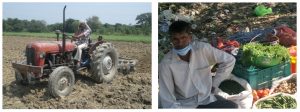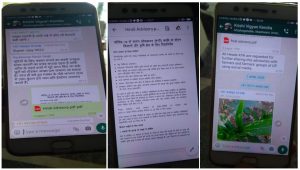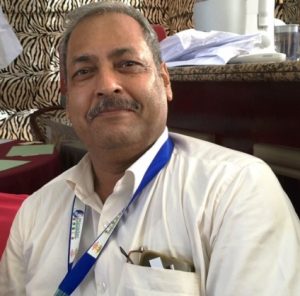As a community of people closely associated with farming and farmers, Extension and Advisory Services (EAS) have to support farmers to deal with the present crisis. Are we effectively fulfilling this responsibility? In this blog, Dr Mahesh Chander examines how EAS providers can support farmers to deal with these challenging times.
CONTEXT
We are passing through difficult times due to an unprecedented crisis situation caused by Coronavirus disease (COVID-19) pandemic. Many countries across the world, including India, are under lockdown and have issued health advisories asking people to remain indoor and not venture out. This has been disrupting. Farming activities in India are adversely affected due to disruptions in the input and output value chains (Box 1). Farmers engaged in all sectors (food grains, vegetables, fruits, milk and poultry) are affected as they are finding it difficult to harvest and transport their produce.
EAS AND COVID 19
The Extension and Advisory Services (EAS) are expected to be closely associated with farmers for purposeful and effective sharing of information. Citizens in general trust Extension as a credible source of locally relevant information and appreciate Extension’s effective connections with other organizations. Currently, when farmers and other agri-value chain actors face unprecedented challenges, the proactive role of EAS can not only enhance its prestige, but it can also build trust in the farming community. It is also our moral responsibility. The major strengths of EAS lie in its dedicated staff, methods and good practices in dealing with farmers and other stakeholders for agricultural development and farmer empowerment.
Extension’s response to COVID-19
India has a pluralistic extension system. The Departments of Agriculture at the state/UT level have the most number of staff for EAS on the ground (district, block level and below). Staff at the state level are supported by the National Ministry of Agriculture and Farmers’ Welfare and the Indian Council of Agricultural Research (ICAR). Both organizations are trying to intervene in this situation and have issued advisories to farmers on dealing with current challenges. For instance, the Ministry of Home Affairs (MHA) vide its order no 40-3/2020-D dated 24 March, 2020, issued guidelines to various ministries (Central/State including Union Territories) for containment of COVID-19 epidemic in the country. The Ministry of Home Affairs further issued an addendum to the guidelines on 27 March,2020. Besides restrictions on public movement, these guidelines have made exceptions in the interest of farmers to include delivery of food items, operations of cold storage and warehouses, etc.
Following the MHA order, the Agricultural Extension Division of ICAR has developed Guidelines for farmers and farming sector during lock-down period due to COVID-19. These guidelines indicate that many activities concerned with farmers and farming are considered essential and thus, exempted from restrictions during the lock-down. These include:
- Veterinary hospitals,
- Agencies engaged in procurement of agriculture products, including MSP operations,
- ‘Mandis’ operated by the Agriculture Produce Market Committee or as notified by the State Government,
- Farming operations by farmers and farm workers in the field,
- Custom hiring centres (CHC) related to farm machinery,
- Manufacturing and packaging units of fertilizers, pesticides and seeds, and
- Intra and inter-state movement of harvesting and sowing related machines like combined harvesters and other agriculture/ horticulture implements.
These exemptions are likely to facilitate unhindered activities related to agriculture to ensure essential supplies and farmers do not face difficulties during the lock-down. Necessary directions to concerned ministries/department of States and UTs have been issued for implementation during lock-down. Additionally, advisories have been given in the same circular about harvesting and threshing of crops, post-harvest, storage and marketing of farm produce in addition to those about standing field crops.
Farmers have been advised and are expected to follow precautions and safety measures to prevent the disease’s spread. Simple measures include social distancing, maintaining personal hygiene by hand washing with soap, wearing of face mask, protective clothing and cleaning of implements and machinery. The EAS can spread awareness about these guidelines using their contacts with farmers via channels like Whats App or other suitable mechanisms. Many Krishi Vigyan Kendras (KVK) operate Whats app groups connecting several farmers groups for inter group information sharing.

These advisories need to be disseminated among the farming community rapidly and if possible, in local languages. As soon as these advisories were posted on ICAR’s website, I circulated these in several of my networks, mostly Whats App groups, for further sharing. In the Whats App group, ‘ICAR Extension Research-2020’, Dr A K Singh, DDG (Agricultural Extension) appealed, “These advisories may be shared with farmers and other workers to bring awareness”. His appeal was positively responded to by many ICAR Extension scientists, with some of them making available translations in regional languages. Likewise, the ATARIs and KVKs across the country are expected to spread these advisories and help farmers by providing guidance on farming matters in the prevailing circumstances. If we, as extension service providers, do our job well, farmers will develop confidence in us. So COVID-19 is an opportunity in disguise to develop our skills and preparedness to handle such exigencies.

Though EAS has supported farmers during natural disasters (Box 2), COVID-19 is a totally different disaster. Not many have experienced such a pandemic in their lifetime.
| Box 2. EAS and Natural Disasters
On 4 January last year, I published a blog for AESA entitled, ‘Natural Disasters and Extension & Advisory Services (EAS): Lessons for Better Preparedness’. In this blog, I discussed what and how EAS can contribute to disaster reduction, adaptation and mitigation during different phases of natural disasters viz. before, during and after. This blog gives some idea about how EAS professionals can play meaningful rolesin times of natural calamities.The ICAR-IVRI organized animal health cum awareness camps in Odisha in the aftermath of cyclone Phani. The IVRI team led by me assessed the situation and addressed various challenges and problems faced by farmers. The farmers were apprised about steps to be taken, including dos & don’ts, for restoring animal health as early as possible. I also shared this field experience through Facebook posts for wider awareness. Besides IVRI, many other ICAR institutes and several NGOs played a crucial role in providing relief and rehabilitation for recovery from Phani’s impact. Many institutions worldwide are now better prepared to cope with common natural disasters by drawing lessons from varied experiences over the years. |
World over, the experience of handling the present situation is very limited. It is truly unprecedented, so we need to be innovative and creative to come out with ideas towards solving the crisis. Some of the state Departments of Agriculture are now currently trying to help farmers to deal with the situation.
For instance, the Department of Agriculture, Punjab, is working on a strategy to ensure that social distancing is followed during the procurement of food grains. The middlemen and related government departments are being taken on board to decongest mandis and ensure that close human interactions are avoided.In Haryana, preparations are being made to delay wheat procurement to 20 April and the state has prepared a staggered procurement schedule to make crop arrival steady and cut gluts in mandis. Haryana has requested the Centre to approve higher Minimum Support Price (MSP) for farmers who delay the arrival of their produce of wheat. In a letter to the Centre, the state said staggered arrival would allow smooth procurement and help contain spread of the disease as well.
The EAS functionaries can help farmers in direct marketing of their produce to consumers by developing producer-consumer alliance. We can promote startups that can take up various roles along the value chains. For instance, some startups are supplying farm fresh fruits and vegetables to consumers by linking farmers and consumers. Also, many initiatives are being taken by farmers to help themselves. For instance, small farmers in Maharashtra are joining hands to take vegetables and fruits to the doorsteps of housing societies as big markets and Agricultural Produce Market Committees (APMCs) are not fully functional because of lock-down. In many places, the district administration is connecting farmers’ groups to housing complexes. As a result, profits earned are directly accruing to cultivators instead of getting divided among middlemen and wholesale dealers while consumers are getting a better deal. In Meghalaya, the Department of Agriculture & Farmers’ Welfare, Government of Meghalaya (India) is using ICT solutions to support farmers who are facing marketing issues resulting from the lock-down imposed due to COVID-19 Pandemic EAS in South Asian countries need to enhance their capacities to deal with disasters, something similar to what Extension Disaster Education Network (EDEN) is doing in the USA (Box 3).
Can we create something like EDEN in South Asia ? If yes, who will take the lead ? We know creating something is easier than maintaining it, which calls for dedication and commitment. We should also share our experiences with the GFRAS and AESA through the dedicated pages created on their websites.
| Box 3. Strengthening EAS capacities to better respond to disasters
The Extension Disaster Education Network (EDEN) serves as a disaster-related resource portal for extension personnel to share with their clientele to help the latter prepare for, stay safe during, and recover from disasters. Several disaster-related educational programs are available through EDEN. Currently, it is a hub of extension resources related to the COVID-19 situation. Global Forum for Rural Advisory Services (GFRAS) has created a dedicated section on its website to collect tips and best practices; to better addresses the problems created by COVID-19. This section is divided into three categories: The Agricultural Extension in South Asia (AESA) too has created a new section on COVID-19 and EAS to: This gives an opportunity to everyone concerned to share their experiences on: |
The Farmers Producer Companies (FPCs) are selling fruit and vegetable baskets in line with the demand from individual consumers or housing societies. The EAS can make efforts to expedite formation of FPOs. Already, the KVKs have been given target to promote and organize FPOs in every district. Shri Kailash Choudhary, Union Minister of State for Agriculture & Farmers’ Welfare, while inaugurating the one-day Review Workshop of Krishi Vigyan Kendras emphasized KVKs’role in technical back stopping of Farmer Producer Organizations (FPOs) and helping in marketing of agricultural produce. Shri Roul, the then Secretary, ICAR, said FPOs can reduce the input cost, give farmers more stake in marketing and value chain.Organizing FPOs is not a simple task; not many KVKs are successful in doing it. Yet, there are success stories of KVKs collaborating with FPCs. MANAGE has documented issues, challenges and successful FPCs across the country. EAS providers can draw lessons from such documents to speed up FPC formation.
The need for linking farmers to the market is being strongly felt, suggests recent extension literature. To meet this emerging demand, farm universities and KVKs can launch online initiatives to directly link farmers with consumers. Agricultural experts of KVKs may be immediately involved by the government in launching such marketing initiatives so that farmers can find solutions within their districts. Farmers may be allowed to directly sell to consumers at local and district levels by making available places for organizing farmer markets.
As rabiharvesting is likely to pick up in the coming days, the ICAR asked farmers on 28 March, 2020, to follow social distancing and safety precautions while handling farm machines and working in the fields. For tackling emerging issues related to managing crops, livestock and fisheries, farmers should consult and be in touch with agri-scientists in KVKs, ICAR research institutes and state agricultural universities for timely advisories, Dr Trilochan Mohapatra, Secretary, DARE and Director General, ICAR, said.
LESSONS FOR THE FUTURE
Only a few possible ideas and actions have been discussed here. There could be several other initiatives which EAS can undertake to minimize the suffering of farming communities. COVID-19 like situations demand more online services. Extension functionaries should have the knowledge and skills in social media and its uses, including the current tools, methods and models for crisis communication. Extensionists need to be equipped to use Facebook, Whats App, Twitter, YouTube, etc. They need to learn and master skills to disseminate information and monitor, track, measure, and analyse social media traffic. Besides, skills in mobilizing farmers and facilitating interaction are very much needed to secure coordination of different agencies to broker gains for farmers.
In recent times, Whats App has become very popular among farmers to share information on farming practices, which could be even more useful during COVID-19 like situations. But social media channels, especially Whats App, can be harmful too, due to spread of fake, misleading information and rumours. Poultry farmers are currently suffering huge losses due to fake information circulated via Whats App forwards that linked consumption of eggs and poultry to corona virus infection.
Every crisis gives an opportunity to learn and do better.So is the case with COVID-19. Hope we will be able to better serve the farming community now and in the coming days.

Dr Mahesh Chander is Principal Scientist & Head, Division of Extension Education at ICAR- Indian Veterinary Research Institute, Izatnagar-243 122 (UP),India.
Email: drmahesh.chander@gmail.com









Very informative article about the role of EAS to reduce farmers problems in this difficult hour. The important aspects how to support by synergistic approach .
Nicely written and timely blog. A comprehensive analysis of the present crisis from the perspective of an EAS professional.
Sir, very good and nicely written blog. Your analysis and lessons for the future should be addressed and exploited at block/district level. So that small and marginal farming community should get benefit!!!
Nice overview of ICAR & State government efforts towards current situation.
Sir! Highly informative and persuasive blog. The need and role of EAS for farming community during COVID-19 has been well-described. As recommended in this blog, initiatives for forming FPOs, creating EDEN and linking farmers and consumers through online should be carried out as the farmers and farming are facing many challenges. EAS providers should develop and update their competencies as recommended in this blog, so that EAS can reach every farmer and help the farming community to confront any crisis.
Congratulations to Dr Mahesh sir for bringing the document on right time, covering all aspects of the EAS required during corona crisis. Some non-traditional EAS providers like FPOs and FPCs are playing important role in dissemination of advisories and providing services to the members in states like Maharashtra. When it has become difficult for individual farmers to sell their products during lockdown and social distancing time, collectively FPOs are doing required packing and marketing at doorstep of urban consumers.
Some whats app groups like “Hoy aamhi shetkari” meaning yes we are farmers in Maharashtra are providing required information to farmers during these days. Article also identified the need of extensionist to be abreast about social media usage as most of the farmers are using it. Article rightly pointed out the need of EDEN like network during such disasters for providing EAS to the farmers. Congratulations.
Congratulations dear Mahesh Chander sir! It’s very timely blog covering all the aspects of EAS during such pandemics.
Yes on one side its worrisome situation for our farming community, however at the same time farmer Collectives in general and FPCs in particular across country are helping (urban) consumers by providing (daily/ weekly) Agro produce at their doorstep.
This is what it is intended that FPCs should streamline the forwards linkages of member farmers.
This is the right time for FPOs/ FPCs across country to create and establish the network with consumers and must continue to provide services at doorstep and thereby earn maximum share in consumers rupee.
Congratulations to Dr.Mahesh Chander on coming out with a very informative blog on ways and means to help farmers during the lockdown period. Only thing is we need to depend up on online services and dedicated extension professionals. I expected some agencies to give their experiences in helping the farmers’ problems during this Corona crisis. Corona may help fish farmers in future because of the improved quality of water in the rivers and ponds.